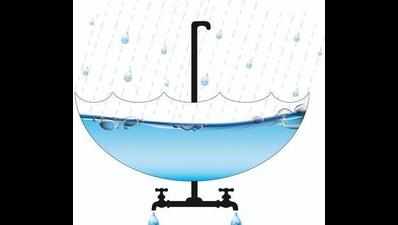- News
- City News
- Hyderabad News
- Water Board involves NGOs to promote rainwater harvesting
Trending
This story is from June 27, 2016
Water Board involves NGOs to promote rainwater harvesting
To improve groundwater table, the Hyderabad Metropolitan Water Supply and Sewerage Board (HMWS&SB) has decided to rope in non-governmental organisations (NGOs) to promote rain water harvesting (RWH) pits in non-residential areas, including industrial units and central government institutions.

Representative photo.
HYDERABAD: To improve groundwater table, the Hyderabad Metropolitan Water Supply and Sewerage Board (HMWS&SB) has decided to rope in non-governmental organisations (NGOs) to promote rain water harvesting (RWH) pits in non-residential areas, including industrial units and central government institutions.
According to the water board records, there were nearly 25,000 water connections (non-domestic category) and getting assured quantity of water since inspection.Industrial units are located in operation and maintenance (O&M) divisions VII (Tarnaka, Sanatnagar,), VIII (Patancheru), IX (Balanagar), XI (Sahebnagar IDA, Balanagar IDH, Nacharam Industrial Area), XII (Jeedimetla, Chintal) and XV (Ramchandrapuram).
"The reason for concentrating on non-residential areas and central government institutions is they have large open spaces on their premises. Though we will not bear the expenditure for putting in place RWHs pits, we will provide technical assistance. The number of RWH pits will be identified based on the space available at industrial units and central government institutions," assistant director, ground water department working with HMWS&SB, J Satyanarayana told TOI.
"We have many central government research institutions and defence units in the city. The water board will educate managements of these institutions to assess their impact on the environment and social wellbeing. We will take the help of city-based non-governmental organisations (NGOs) to promote RWH concept during the 60-day action plan," he said. However, the managements have to take responsibility of maintaining the RWH pits.
"A three-year plan to implement the RWH concept to improve groundwater table in Greater Hyderabad is under process. The water board is working out the modalities," he added.
According to the water board records, there were nearly 25,000 water connections (non-domestic category) and getting assured quantity of water since inspection.Industrial units are located in operation and maintenance (O&M) divisions VII (Tarnaka, Sanatnagar,), VIII (Patancheru), IX (Balanagar), XI (Sahebnagar IDA, Balanagar IDH, Nacharam Industrial Area), XII (Jeedimetla, Chintal) and XV (Ramchandrapuram).
"The reason for concentrating on non-residential areas and central government institutions is they have large open spaces on their premises. Though we will not bear the expenditure for putting in place RWHs pits, we will provide technical assistance. The number of RWH pits will be identified based on the space available at industrial units and central government institutions," assistant director, ground water department working with HMWS&SB, J Satyanarayana told TOI.
"We have many central government research institutions and defence units in the city. The water board will educate managements of these institutions to assess their impact on the environment and social wellbeing. We will take the help of city-based non-governmental organisations (NGOs) to promote RWH concept during the 60-day action plan," he said. However, the managements have to take responsibility of maintaining the RWH pits.
Regarding residential colonies, the official said, "So far, we have put in place 2,000 RWH pits, geo-tagged them and took images for the record. These RWH pits were constructed at water board's own expenditure, but the responsibility of maintaining them was given to the residential welfare associations concerned," the official said.
"A three-year plan to implement the RWH concept to improve groundwater table in Greater Hyderabad is under process. The water board is working out the modalities," he added.
End of Article
FOLLOW US ON SOCIAL MEDIA










